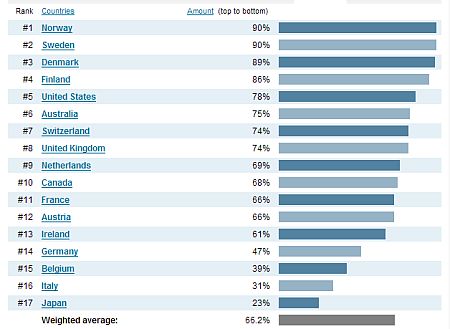Percent Willing to Fight for Country

DEFINITION: Percentage in 1990s surveys responding that they are willing to fight for their country.
SOURCE: World Values Survey, via NationMaster
Maybe not, when it comes to national defense. The Scandinavian countries have the most extensive welfare states, and the highest proportion of their populations willing to fight for their countries.
It is probably the quasi-tribal nature of Scandinavian societies, characterized by strong social solidarity, that explains both the popularity of their welfare states and the willingness of their citizens to fight for their countries. Scandinavian societies are, or were till recently, homogenous, high trust, principles-based, high context societies. In more heterogenous societies there is less trust, and since diverse populations do not share the same values, they tend to be low-context, rules-based societies.
This can be seen in a number of disparate things, e.g. accounting standards and technical manuals. American accounting standards are rules based, and European standards are principles based. Technical manuals are much better when written by someone from a low-context society. The writer is used to the idea of explaining things to someone with no shared experiences. Japanese technical manuals are unreadable, even when the English is correct. American manuals are the best.
How will Scandinavian welfare states develop? We have an interesting natural experiment. Denmark and Finland restrict immigration, while Sweden have lots of unemployed, welfare-receiving immigrants. When welfare recipients are visibly different, they tend to be perceived as being less deserving. The future prospects for the welfare state are probably better in Denmark and Finland than in Sweden.

Well, they *say* they are willing to fight to defend their country, but that’s real easy to say when no one calls them on it.
Last time someone did with the Swedes, for example, they chose neutrality with Nazi Germany.
I think it’s simply b.s. posturing.
The Winter War is a counterexample.
Good catch.
I also think it’s interesting that Germany, Italy and Japan are three of the bottom four — I guess their cultures have been enduringly delimitarized post-WWII
Your are right, the experiences of loosing plus post-war demilitarization seem to have worked.
I also think there is something to John Xenakis’ theory of Crisis Wars, see e.g. here.
I bet you wouldn’t be so cocky if a Nazi army knocked on your door.
Sorry if this is an old post but I had to reply
What I meant was that total annihilation isnt a smart option over neutrality. War is a last resort option.
guys.. same way today Americans and aliens knocking the other doors… so they don’t have right to fight back???
despite the rulers of those countries are on US payroll..!!!